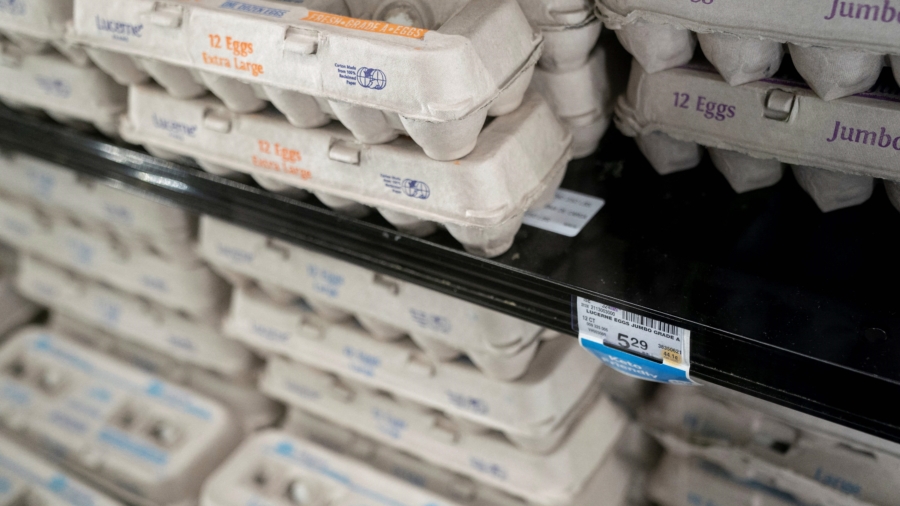The latest government inflation data showed that price pressures remained shockingly high in certain categories, with egg prices up over 70 percent in annualized terms while many food categories were up by double digits.
While the overall pace of annual inflation in the United States came in at 6.4 percent in January, according to the Bureau of Labor Statistics (BLS), the rate of inflation in some categories—especially food—was stubbornly high.
Prices of food at grocery stores rose 11.3 percent year-over-year while food in the “away from home” category like restaurants rose by 8.2 percent.
Egg prices soared by 70.1 percent year-over-year, the report showed, while margarine was up 44.7 percent, bread rose 14.9 percent, and ham was up 7.2 percent.
While many of the food price gains were more modest when looked at in month-over-month terms—margarine up 1.2 percent, bread up 0.2 percent, and ham up 5.2 percent—egg prices rose by a stunning 8.5 percent in monthly terms as well.
Egg prices have been under pressure due to a deadly bird flu that has decimated chicken flocks. While wholesale egg prices have retreated, that hasn’t yet trickled down to grocery stores.
Bankrate chief financial analyst, Greg McBride, told The Epoch Times in an emailed statement that there were a few brighter spots in the inflation report but overall it was far from satisfactory.
“The broad-based improvement needed to be seen in order to feel good about where inflation is headed is still lacking. The leading contributors continue to be categories that are staples of the household budget—food, shelter, electricity, natural gas, apparel, vehicle insurance, and household furnishing and operations,” he said.
Shelter costs were up 7.9 percent in annual terms, electricity rose 11.9 percent, and natural gas was up 26.7 percent, the report showed.
‘Pure Gaslighting’
Still, the headline pace of inflation at 6.4 percent represented the seventh straight month of declines, prompting President Joe Biden to celebrate.
“Today’s data shows annual inflation falling for seven months, real wages for working Americans up over that time, and food and gas prices down—getting breathing room to families,” the president said in a statement on Twitter.
Tommy Pigott, the Republican National Committee’s (RNC) rapid response director, reacted to Biden’s tweet by accusing the president of “pure gaslighting.”
“Year-over-year real wages have been negative for 22 months, grocery prices are up 11.3%, and inflation has accelerated from last month,” he said in a post on Twitter. “Families are POORER because of Joe Biden’s disastrous agenda!”
While the headline pace of year-over-year inflation fell from 6.5 percent in December to 6.4 percent in January, the month-over-month pace accelerated sharply from 0.1 percent in December to 0.5 percent in January.
In his State of the Union address a week ago, Biden said that inflation was falling.
“We have more to do, but here at home, inflation is coming down. Here at home, gas prices are down $1.50 a gallon since their peak. Food inflation is coming down. Inflation has fallen every month for the last six months while take home pay has gone up,” he said.
‘Massive Failure’
Republicans pointed to Tuesday’s inflation report—in particular, the monthly acceleration in prices—as proving Biden wrong.
“One week ago, Biden told Americans that inflation was coming down. But prices rose again, which means real paychecks shrank,” Sen. John Kennedy (R-La.) said in a statement on social media.
Sen. Tom Cotton (R-Ark.) also heaped criticism onto the president.
“Not surprisingly, Biden’s plan to spend our way out of inflation has been a massive failure,” Cotton said in a tweet.
Market reaction to the news was also negative, with the Dow Jones plunging around 400 points after the data was released, though it had clawed back some of the losses at the time of reporting.
“There is nothing in this CPI report to deter Fed from staying the course of another quarter-point interest rate hike,” McBride told The Epoch Times, while other analysts similarly suggested that the inflation report did little to reduce pressure on the Fed to continue raising interest rates to try and relieve price pressures.
Richmond Fed President Thomas Barkin said in response to the data that the central bank may need to raise interest rates higher than previously expected if inflation continues to run too hot.
Barkin told Bloomberg that the inflation data was roughly in line with forecasts but added that he expects price pressures to keep percolating for longer.
“Inflation is normalizing but it’s coming down slowly,” he said. “I just think there’s going to be a lot more inertia, a lot more persistence to inflation.”
Barkin said that the lingering impacts of COVID-19, unspent stimulus money, and supply chain kinks that have yet to be ironed out all contributed to elevated prices.
He added that the steady stream of high inflation data has prompted many businesses with pricing power to keep marking up products and “try to test where the levels of inelasticity really are.”
McBride said that the Fed has a ways to go before prices fall back to around the central bank’s 2 percent target.
“Inflation has shredded household budgets over the past 2 years, and not just when it comes to one-off discretionary expenses or special occasions, but for keeping up with day-to-day bills,” he said.
“Until inflation returns to the 2% neighborhood, pressure on household finances will continue.”
From The Epoch Times

